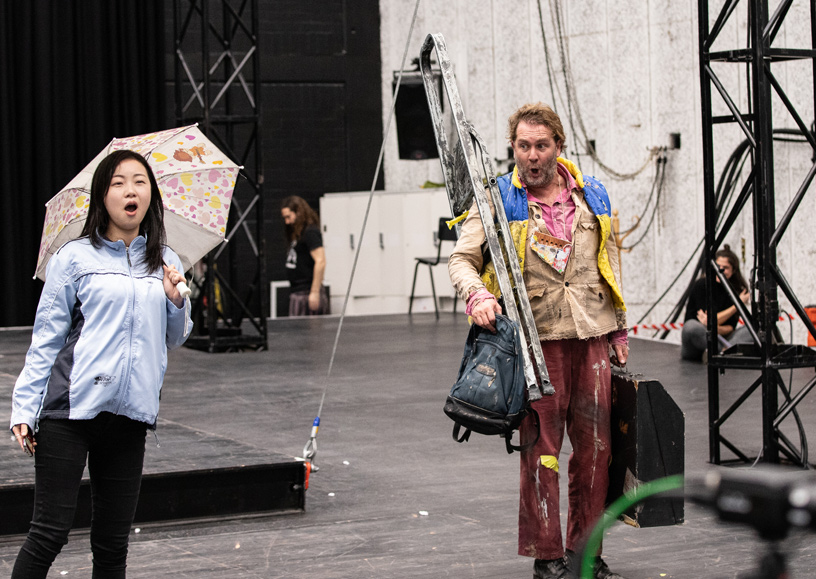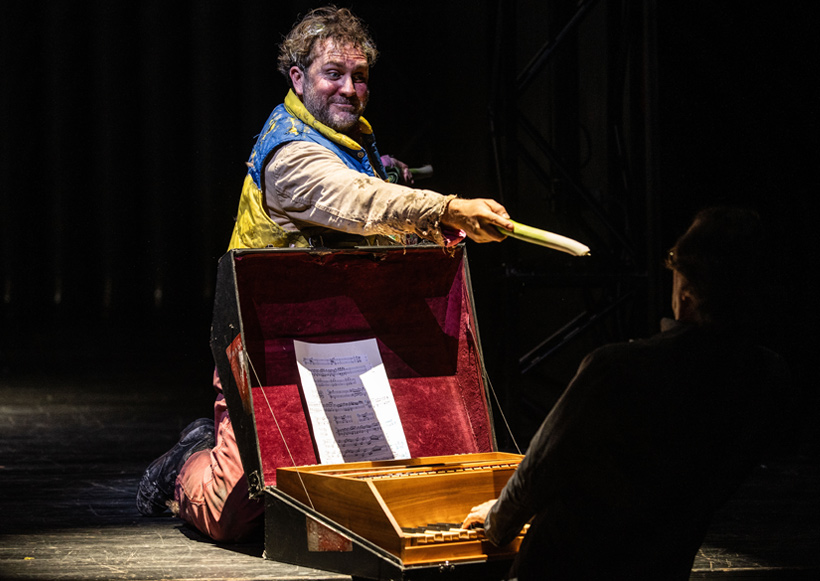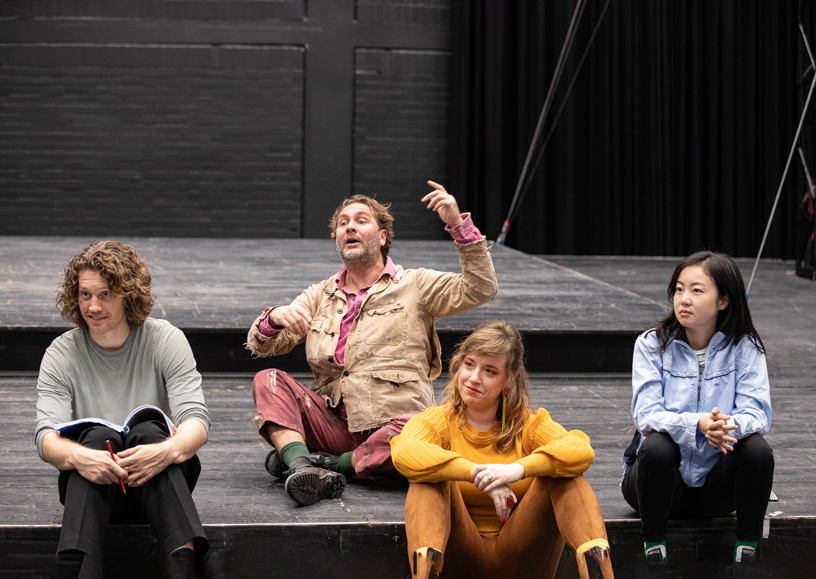
Silent approval: Simon McBurney on Die Zauberflöte
On 7 October 1791, Mozart, having just returned from a performance of The Magic Flute, writes to his wife Constanze that despite the house being full, and despite listing all the numbers that were given an encore, '... what always gives me the most pleasure is the silent approval'. Silent approval is not necessarily the first thing you associate with The Magic Flute. Laughter, applause, people singing along, perhaps, but silence?
Layers and confusion
Rehearsing The Magic Flute is like conducting an archaeological excavation. The more layers you uncover the more artifacts are revealed. But making sense of what you find is the hard part. Nothing is what it seems. One landscape rolls back to reveal another: The sorrowing mother turns out to be a vengeful harpy; the horrible abductor of her daughter is more of an encouraging godfather than a despot, even if he does exercise total power over his people. But if he is a despot, then he is one who believes in wisdom and care - but with an assistant who is a rapist. In this strange world, as remote as Prospero's island, boys are wise men, and grown men have no wisdom at all. The women are abused, but Pamina, the woman at the centre of it, is the one person who has the strength and intelligence to hold the whole thing together: Here, even if the jokes are not really funny, the most comic character is the most moving. And if the landscape is strange, the story is even more eccentric.
‘Can you fix it?’
‘Well, we could put this piece of Papageno's dialogue later and that would clarify the story...’
‘Wait, no, hang on, I wasn't talking to you.’
‘We have a problem with the story here...’
‘I know, but wait... quite quickly after it starts the forward movement seems to get out of control...’
‘Yes, that's exactly what is happening with the narrative...’
‘No, no, please... wait! I am talking to the technical team about the movement of this piece of stage machinery... not about the bloody story.’
‘Yep... but you have to deal with it because it doesn't make sense...’
This is how it is in rehearsal. The moment you break, multiple conversations begin overlapping and colliding. Misunderstandings everywhere. Chaos.
On this particular day, I am watching as the movement of the stage machinery gradually gets more and more out of control. The other conversations are flying at me simultaneously, creating a kind of turbulence that I have no way of controlling. The movement gets out of control because it is chaotic, explains one of the incredible technical stage managers. He is pointing at the winch mechanism. The moment it is set in motion, the movement loops and simply gets worse and worse. It is sensitive to the initial conditions, and if there is a tiny instability, it gets in a loop it cannot get out of.
‘Ah’ I reply.
‘It is all about how it begins,’ he says.

'It is all about how it begins; I repeat to myself, as the singers and actors leave the room for a coffee. 'Sensitivity to the initial conditions'. In chaos theory, 'an arbitrarily small perturbation of the current trajectory may lead to significantly different future behaviour.' Or to put it another way, when you begin, any disturbance will mean you have no idea what chaotic thing you will end up with. Like the weather. We really have no idea where it comes from and what it will do next. Yet it seems to have its own pattern and logic. Like The Magic Flute. Sometimes illogical, occasionally unfathomable, and in places even unintelligible, nevertheless it has its own pattern and logic. When it works, you do not always know why.
Bringing order
I throw some more coffee down me as I remember how difficult it is to tell the story to someone, let alone perform it. And believe me, for the past year I have tried on numerous occasions to tell the story to friends who do not know the opera. Simply to bring some order to my thinking about it.
‘It's a kind of fairy story.’
‘Kind of?’
‘Yes, well other stories are in it too’
‘Ok so...?’
‘It begins with a guy being chased by a snake... ’
‘Cool.’
But within minutes I am out of control... I glance up at my friend who I am telling this to, as I begin to grind through the first few events. I have not even got into the arrival of the Queen of the Night. I try another tack.
‘Well... let just say it's shot full of really fascinating stuff. .. the number three, for instance, is key. ’
‘Three’
‘Yeah, well, three is amazing. It's the smallest odd prime, you know? DNA has a triplet system... I mean, it's incredible, we are hard-wired for the number three: it's set into our genetic code and permeates all levels of our culture and, and, and... (I am starting to gabble now as I see his eyes glaze over) there are three main Abrahamic religions, after all, Judaism, Christianity and Islam... Jesus rose from the dead on the third day... there are three wise men... and in The Magic Flute three is everywhere: there are three ladies, three boys, three priests, the whole opera begins with three chords in the key of E flat major (I throw in airily), E flat major has three flats in it and... ’
‘Well, sounds gripping, interrupts my friend suddenly. I can see you've got your work cut out. Good night, sleep well. See you for breakfast. ’
Three artists
I look around at the mad activity of our rehearsal room. What must it have been like with all of them in their room in 1791, in Vienna? Emanuel Schikaneder and Carl Giesecke (the librettists) and Mozart. Surely a kind of chaos with these three (yes, three of them) who were as unexpected as the piece they wove.

Carl Ludwig Giesecke, the famously women-hating polymath who originally played the First Slave, who left Vienna in a hurry and ended up as a mineralogist, rowing round Greenland in an umiak. An umiak is an Inuit boat, made and used by women, constructed out of driftwood, antler and stretched hide. A paradox for an undistinguished Viennese misogynist! that it should be a vessel constructed for and by women that saved his life on more than one occasion.
Emanuel Schikaneder, builder of the Theater an der Wien, one of the greatest men of the theatre of his time; and famously unreliable, constantly unfaithful to his wife, sculpting, rewriting and creating this piece about fidelity, harmony, truth and friendship. At the end of his life, he put Beethoven in a fiat above the theatre and paid him to write an opera, all the white haranguing him, to write faster. 1Mozart could write an overture in a couple of days,' he would yell.
And Mozart. Dying. Writing to Constanze, full of irony about this new opera he had composed, yet delighted by its success - the fact that ‘...you can see it [The Magic Flute] really becoming more and more respected and esteemed'. Just months earlier; it has been suggested, that he would have rather made an opera using The Tempest. And surely The Tempest is everywhere in the Flute: Sarastro is so like Prospero, Tamino is Ferdinand, Pamina is Miranda, Monostatos is a relative of Caliban, the Three Spirits are Ariel-like spirits...
Magic
In the rehearsal room before the singers and actors return from their coffee, my mind continues to whirl with its own unending turbulence. Okay, so it is called The Magic Flute. So it has to be magic. And there must be a flute. And why a flute? I think about a rock shelter in north-western Libya. Near the Mediterranean, called the Haua Fteah. My father; who was a prehistorian, excavated it in the early 1950s and discovered it had been occupied by humans, without interruption, for 90,000 years. And in the layer dated to 35,000 years ago, he uncovered a bone. Hollow. A fragment Bu,r.,-,1ith a hole in it. And another half-hole at the break. A bone flute. Perhaps the world’s oldest existing instrument. So the flute was one of the first instruments. A harnessing of human breath. Elemental. Mythic. And the magic? Magic is about change. Changing something into something else. Making things appear; and disappear. It is always easier to tell all you want to tell. whe,n you tell a story that involves magic. Because we all know it is not ‘real'. But of course, through the non-reality of the ‘fairy tale' we can recognize the true reality of our world. The psychological and symbolic meaning of fairy tales is well documented. It can even hide, perhaps, politically charged topics that cannot be given open voice. Allusions to the emperors and empresses, even perhaps expressions of our desire for the creation of a new society ... like those Shakespeare included in The Tempest.

But perhaps above all, magic can change people: change who they are and how they behave. The moment I have this thought it creates another mental storm. For this piece seems to accept almost any interpretation, just as it sometimes resists, paradoxically, any interpretation. I begin to feel nervous. Should I be making it full of historical references? Placing an emphasis on the Masonic stuff? Making a popular entertainment? Is it just a comedy, does it mean anything deeper at all, does it. .. does it... ? The singers and conductor are about to return. I have to pull myself together. The pianist is practising the opening notes of the Act II finale.
‘...what always gives me the most pleasure is the silent approval’,
The Magic Flute. A flute that is magic. A flute that can change.
Text: Simon McBurney